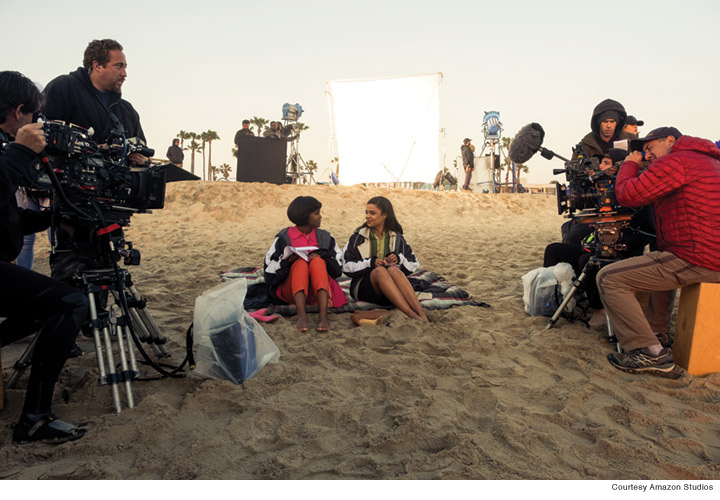
Years in the making, this producer’s film centers around Black elegance and romance in the 1950s and 1960s.
From canary yellow hats to office bar carts, Mad Men and The Marvelous Mrs. Maisel resurrect 1950s and ’60s America piece by retro piece. But Gabrielle Glore W’91, who considers herself a fan of both shows, kept noticing what they left out.
“When you look at the Black characters in a show like Mad Men, for the most part they’re assistants and elevator operators,” she says. She saw the same thing in other contemporary fare set midcentury: Black characters were either consigned to shallow roles or framed through their trauma.
Where, she wondered, were the Black men and women who filled her own family albums? “Myself and many others I know can look through old photo albums and see this everyday elegance of the Black community and their Black families,” Glore says. People who launched their own companies. Who attended prep schools and became debutantes. Who fell in love and cooked big family dinners and grooved to their favorite jazz albums.
And then one day she found them: inside the script of an old-fashioned love story, set in the late 1950s and early 1960s, that centered around Black characters who dwelled in those smaller, everyday moments. Glore became a producer on that movie, Sylvie’s Love, which debuted at the Sundance Film Festival in early 2020 and launched on Amazon Prime Video last December—thanks to nearly a decade of her persistence.
With enthusiastic reviews from critics and viewers, the film marks her farthest-reaching—and, she says, most personally fulfilling—project to date. But narrative film producer is a role Glore has been inching toward ever since her days at Penn.

As her friend Jennifer Baltimore C’89, whom Glore met her second day on campus, notes, “It’s interesting to see her on this journey of becoming a storyteller, because I think she’s always been one to study relationships. She’s fascinated by others’ stories. That’s what makes her such a good friend. Sometimes she remembers my life better than I remember it.”
Glore came to Wharton from St. Louis in the late 1980s, already planning on a career in marketing. She didn’t realize that most of her classes would focus on finance and accounting instead. “I had to be much more proactive around my job search,” she says, “because at that time, entertainment companies weren’t coming to Wharton for recruiting.”
She turned down an offer from Procter & Gamble and went to HBO, where she helped promote the network’s newest series and original films. After moving through multiple marketing roles within parent company Time Warner, Glore launched her own branding, marketing, and production LLC in 2002.
HBO became Glore’s first client, and through that work, she met the founder of a fledgling film festival called Urbanworld. She’s been involved ever since, and now serves as the festival’s director and head of programming. This year marks her 17th with Urbanworld, which is scheduled to run from September 29 to October 3.
“We’re looking for the most interesting stories from around the world that are going to educate our audiences and move them in some way,” Glore says. “It’s also an opportunity to lean into content creators of color, women, and the LGBTQ community, so that all of these traditionally marginalized communities have an opportunity and a platform to share their work.”
Working so close to films and the people who make them revved up Glore’s own interest in storytelling. She executive produced a family dramedy called Dirty Laundry in 2006 and invested in ESPN Films’ documentary Through the Fire. But the game-changing moment came in 2012, when she chatted with a writer/director who was debuting his first narrative film at a festival in Atlanta.
After Eugene Ashe outlined his vision for his next project—which became Sylvie’s Love—Glore quickly signed on to help him make it happen. Neither of them expected it would take more than seven years to start filming.
“There were a lot of no’s along the way,” Glore recalls. The same thing that made Sylvie’s Love special—that it was a story not seen before—was also the reason that studios and financiers were wary. “No one really wanted to take a chance,” she says. “A lot of what we heard was, ‘There’s no comparable film we can equate this to.’”
But she kept pressing forward. “It was Gabrielle who gave me the strength to persevere and believe that it would happen,” Ashe says. “Just having a comrade in arms meant so much to me, and she was that comrade.”
In the end, Glore had a hand in everything from script development to casting suggestions to landing financing. She was also on set for the entire filming process and ran point with Amazon when they acquired Sylvie’s Love at Sundance.
“I call Gabrielle ‘The Velvet Hammer,’” Ashe says. “She always tells me the truth, in a diplomatic way, which I appreciate.” (Her friend Baltimore compares Glore to a cheetah: “She moves quietly but swiftly.”)
Written and directed by Ashe, with a cast led by Tessa Thompson and Nnamdi Asomugha, Sylvie’s Love follows the on-again/off-again love story between a jazz saxophonist and a young woman whose dad owns a record shop. The soundtrack is transportive, the costumes and sets rival any episode of Mad Men or Maisel—but the cast is almost entirely made up of Black and Latinx actors.
“It’s about looking at the Black experience through the lens of humanity as opposed to adversity,” Glore says. “We wanted to center on these Black characters in a way that is aspirational and didn’t have any of the story rooted in trauma.”
The character of Sylvie (played by Thompson) felt familiar. Glore saw her late mother’s sense of style, elegance, and love of music in her. She also saw shades of her own career ambition. “Pursuing what I want to pursue and going after it is very much a part of who I am,” she says.
She hopes Sylvie’s Love marks a pivot in her career, with a focus entirely on storytelling—especially stories about the experience of Black women and other people of color. “That is very much a thread through everything that I do,” she says. In the next few years, she hopes to shift all her work to creative producing.
At the moment, Glore is already working on several new films and TV series. They range from animated to unscripted, narrative and episodic anthology, “but they all fit that architecture of: How do we do something different? How do we see the unseen?” she says.
“It feels like an exciting new chapter,” Glore adds, “and I’m all about new chapters.”
—Molly Petrilla C’06




